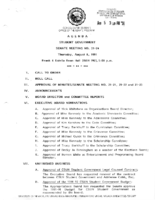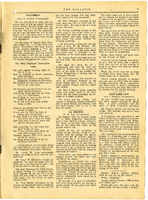Search the Special Collections and Archives Portal
Search Results
Barbara Atkinson oral history interview
Identifier
Abstract
Oral history interview with Barbara Atkinson conducted by Claytee D. White on August 5, 2019 for the UNLV School of Medicine Oral History Project. Atkinson begins by talking about her family and early life. She recounts her experience in medical school, women in medicine, and sexism and discrimination in medical schools. She brings up her mentors and what she had learned from each of them. She explains her pathology specialization, her research, and publications she has written. After, Atkinson talks about her occupation history and her retirement. She mentions how some attitudes about women and sexism have changed and some have stayed the same within the medical profession. She was hired by Don Snyder, John White, and Carl Reiber in 2014 to make a medical school at the University of Nevada, Las Vegas. She goes in depth about the process, plans, obstacles, and the general medical training the students go through. Atkinson then talks about the history of Nevada's medical schools in Reno, Nevada and Las Vegas, Nevada. Lastly, she talks about her opinions on health care, her outlook on future generations, future plans for UNLV School of Medicine, and community of color interactions.
Archival Collection
Alan Stock oral history interview
Identifier
Abstract
Oral history interview with Alan Stock conducted by Barbara Tabach on December 27, 2017 for the Remembering 1 October Oral History Project. In this interview, Alan Stock discusses moving to Las Vegas, Nevada in 1999 for his job as a radio talk show host for KXNT. Stock describes the broadcast that covered the October 1, 2017 Las Vegas mass shooting from 11 PM on that night until 9 AM the next morning. He talks about some of the calls the station received from various members of the community, including survivors of the shooting, families of those at the event, people on lockdown in the nearby hotels, doctors, and general listeners. Stock describes some of the topics discussed on the broadcast, such as what was currently happening on the Las Vegas Strip, stories of the aftermath, and the support needed from the general public. Other topics include gun control and conspiracy theories. He discusses the impact this and other shootings would have on public affairs, including tighter security in daily living and public gatherings. He compares security in the United States to security in Israel and other countries, focusing on the idea of unconcealed guns worn in public. Throughout this interview, Alan Stock explains that the radio station's goal was to provide accurate information to the public during the aftermath of the October 1, 2017 mass shooting.
Archival Collection
Jill Roberts oral history interview
Identifier
Abstract
Oral history interview with Jill Roberts conducted by Barbara Tabach and Claytee D. White on March 20, 2018 for the Remembering 1 October Oral History Project. In this interview, Jill Roberts discusses her position as the CEO of the Trauma Intervention Program (TIP) of Southern Nevada. She also delves into her part-time work at the coroner's office as a death investigator and discusses her personal background in Las Vegas, Nevada after she moved to the city in 1977. She describes the role TIP had during the aftermath of the October 1, 2017 mass shooting, where well-trained volunteers were dispatched to hotels, hospitals, and anywhere else the survivors reached in order to provide emotional and practical support. Throughout the interview, Roberts emphasizes that the assistance provided to those in a traumatic event depends on each individual's needs. She shares a few examples of what the TIP volunteers had helped with after the shooting, including listening to the survivors' stories as well as providing information on the situation, helping separated loved ones find each other, arranging travel for some survivors to go back to their homes, and procuring clothes and shoes for those who needed them. Roberts also discusses the gratitude TIP had received after the shooting, including the thank you cards sent by Sandy Hook High School.
Archival Collection
Geraldine Sharpe and Dianna Menzel oral history interview
Identifier
Abstract
Oral history interview with Geraldine Sharpe and Dianna Menzel conducted by Claytee D. White on May 23, 2016 for the Boyer Early Las Vegas Oral History Project. In the interview, Sharpe describes her early memories of Las Vegas, Nevada beginning in the 1930s while her daughter, Dianna Menzel, clarifies and adds details. Sharpe recalls moving to St. Thomas, Nevada in 1930, her early life in the area, and memories of family members in Alamo, Nevada. Sharpe then describes moving to Las Vegas after St. Thomas was flooded in the 1930s, her education, and people and locations in her local community. Other subjects Sharpe talks about include housing conditions and recreational activities during the 1930s and 1940s, the Helldorado parades, the Las Vegas Mormon community, and life in Las Vegas during World War II.
Archival Collection
Alice Key oral history interview
Identifier
Abstract
Oral history interview with Alice Key conducted by Claytee D. White, with Joyce Moore and two unidentified individuals on November 11, 2004 for the African Americans in Las Vegas: A Collaborative Oral History Project. In this informal interview, Key talks about her early education, sharing anecdotes along with more serious comments. She continues talking about her early activism, beginning with housing discrimination in Los Angeles, California, the work of President Lyndon Johnson on equal rights, her work on the Clark County Nevada Economic Opportunity Board, and the issue of hiring Black front-of-house employees at the casinos and hotels. She continues chatting about families who own or owned casinos in Las Vegas, different church leaders in the city, and ends talking about early Black entertainers, including Dorothy Dandridge and the Barry Brothers and her own experiences as a dancer.
Archival Collection
Wendell Phillips Williams oral history interview
Identifier
Abstract
Oral history interview with Wendell Phillips Williams conducted by Claytee D. White on October 4, 2021 for African Americans in Las Vegas: a Collaborative Oral History Project.
Wendell Phillips Williams discusses his childhood and education in Louisiana before moving to Las Vegas in 1977. Williams talks of his time teaching for the Clark County School District (CCSD), his radio program "Straight Talk" on KCEP's Power 88.1 radio station, the Crystal Apple Award he received as an educator from CCSD, and how he started the now-longest standing Martin Luther King Jr. parade in the United States. Williams shares his passion for Black history and education as well as the bills he championed as a Nevada State Assemblyman from 1987-2001. He also discusses the historical details of how Madison Elementary School was rebuilt and became the Wendell Phillips Williams Elementary School in 2002.
Archival Collection
Maharis, Mercedes, 1942-
Mercedes Maharis is the former director of Nevada CURE and co-author of the Spartacus Project Report. She began teaching meditation in the Nevada state prison system in 1997. This led to Maharis advocating for inmates’ rights and the beginnings of the Nevada chapter of CURE. They presented the Spartacus Project Report to state leaders and at the December 5, 2000 Board of Prison Commissioners meeting. She co-authored the Spartacus Project Report along with Donald Hinton, Sr., a prisoner advocate whose son was incarcerated at the Indian Springs prison.
Person
Julian Eusebio oral history interview
Identifier
Abstract
Oral history interview with Julian Eusebio conducted by Cecilia Winchell, Jerwin Tiu, and Stefani Evans on June 01, 2022 for the Reflections: the Las Vegas Asian American and Pacific Islander Oral History Project. In this interview, Eusebio discusses his childhood in the Philippines countryside, helping his parents farm and harvest rice. After moving to Manila for college, Eusebio studied architecture and illustrated for comics and magazines. After moving to Los Angeles, California, Eusebio started a construction business, doing landscapes and constructing swimming pools for celebrities such as Michael Jackson. In 1992, he opened another branch in Las Vegas, Nevada. After retiring in 2010, Eusebio took up painting again and cites his favorite artists as Norman Rockwell and Rembrandt. In the remainder of the interview, he discusses his drawing process and how he started showing his artwork throughout the Las Vegas Clark County Library District.
Archival Collection

Meeting minutes for Consolidated Student Senate University of Nevada, Las Vegas, August 8, 1991
Date
Archival Collection
Description
Text

